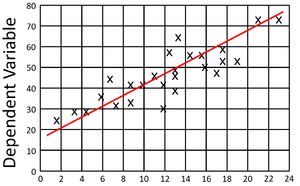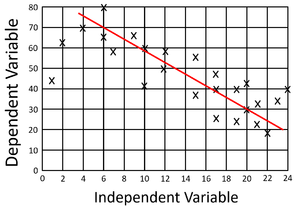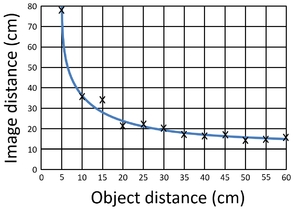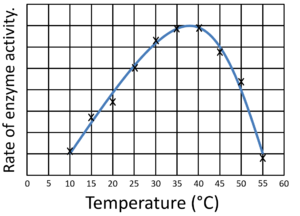Difference between revisions of "Gradient"
(→Equation) |
(→Equation) |
||
| (4 intermediate revisions by 2 users not shown) | |||
| Line 14: | Line 14: | ||
<math>m=\frac{y_2-y_1}{x_2-x_1}</math> | <math>m=\frac{y_2-y_1}{x_2-x_1}</math> | ||
| − | Where | + | Where |
| + | |||
<math>m</math> = The [[gradient]]. | <math>m</math> = The [[gradient]]. | ||
| Line 50: | Line 51: | ||
<math>m=\frac{y_2-y_1}{x_2-x_1}</math> | <math>m=\frac{y_2-y_1}{x_2-x_1}</math> | ||
| − | Where | + | Where |
| + | |||
<math>m</math> = The [[gradient]]. | <math>m</math> = The [[gradient]]. | ||
| Line 77: | Line 79: | ||
| style="height:20px; width:200px; text-align:center;" |This [[Scatter Graph|scatter graph]] showing how [[temperature]] affects [[enzyme]] activity begins with a steep positive [[gradient]] but then changes to a steep negative [[gradient]]. | | style="height:20px; width:200px; text-align:center;" |This [[Scatter Graph|scatter graph]] showing how [[temperature]] affects [[enzyme]] activity begins with a steep positive [[gradient]] but then changes to a steep negative [[gradient]]. | ||
|} | |} | ||
| + | |||
| + | ===References=== | ||
| + | ====AQA==== | ||
| + | |||
| + | :[https://www.amazon.co.uk/gp/product/0008158754/ref=as_li_tl?ie=UTF8&camp=1634&creative=6738&creativeASIN=0008158754&linkCode=as2&tag=nrjc-21&linkId=27ad53b0283feeff7fc5ae04a9e205f358 ''Gradient (graph), page 370-1, GCSE Biology; Student Book, Collins, AQA ''] | ||
| + | :[https://www.amazon.co.uk/gp/product/0008158762/ref=as_li_tl?ie=UTF8&camp=1634&creative=6738&creativeASIN=0008158762&linkCode=as2&tag=nrjc-21&linkId=a0fffa35b3ea49a63404f6704e0df7cc ''Gradient (graph), pages 220-1, GCSE Chemistry; Student Book, Collins, AQA ''] | ||
| + | :[https://www.amazon.co.uk/gp/product/0008158770/ref=as_li_tl?ie=UTF8&camp=1634&creative=6738&creativeASIN=0008158770&linkCode=as2&tag=nrjc-21&linkId=ec31595e720e1529e49876c3866fff6e ''Gradient of graph, pages 145, 179, GCSE Physics; Student Book, Collins, AQA ''] | ||
| + | :[https://www.amazon.co.uk/gp/product/0008158770/ref=as_li_tl?ie=UTF8&camp=1634&creative=6738&creativeASIN=0008158770&linkCode=as2&tag=nrjc-21&linkId=ec31595e720e1529e49876c3866fff6e ''Gradient of graph; tangent, page 145, GCSE Physics; Student Book, Collins, AQA ''] | ||
| + | :[https://www.amazon.co.uk/gp/product/1782946381/ref=as_li_tl?ie=UTF8&camp=1634&creative=6738&creativeASIN=1782946381&linkCode=as2&tag=nrjc-21&linkId=5ec5fc3f6429e30c1d9ab9bca2bccf93 ''Gradients, page 303, GCSE Combined Science Trilogy; Biology, CGP, AQA ''] | ||
| + | :[https://www.amazon.co.uk/gp/product/1782945954/ref=as_li_tl?ie=UTF8&camp=1634&creative=6738&creativeASIN=1782945954&linkCode=as2&tag=nrjc-21&linkId=100574c08fbbb64318256eb79ed61a76 ''Gradients, page 382, GCSE Biology, CGP, AQA ''] | ||
| + | :[https://www.amazon.co.uk/gp/product/1782945563/ref=as_li_tl?ie=UTF8&camp=1634&creative=6738&creativeASIN=1782945563&linkCode=as2&tag=nrjc-21&linkId=9a1d023a374038e6072f33c4f3cf808b ''Gradients, page 7, GCSE Biology; The Revision Guide, CGP, AQA ''] | ||
| + | :[https://www.amazon.co.uk/gp/product/019835939X/ref=as_li_tl?ie=UTF8&camp=1634&creative=6738&creativeASIN=019835939X&linkCode=as2&tag=nrjc-21&linkId=57e96876985fc39b1a3d8a3e3dc238b6 ''Gradients, pages 134-135, 140, 263, GCSE Physics; Third Edition, Oxford University Press, AQA ''] | ||
| + | :[https://www.amazon.co.uk/gp/product/178294639X/ref=as_li_tl?ie=UTF8&camp=1634&creative=6738&creativeASIN=178294639X&linkCode=as2&tag=nrjc-21&linkId=51599bb45a2bfaf7c1b6a978b2ca2616 ''Gradients, pages 171-174, 246, GCSE Combined Science Trilogy; Chemistry, CGP, AQA ''] | ||
| + | :[https://www.amazon.co.uk/gp/product/1782945962/ref=as_li_tl?ie=UTF8&camp=1634&creative=6738&creativeASIN=1782945962&linkCode=as2&tag=nrjc-21&linkId=476bb5c8d1dfb5c08ac81b6d4d1c98d8 ''Gradients, pages 203-206, 324, GCSE Chemistry, CGP, AQA ''] | ||
| + | :[https://www.amazon.co.uk/gp/product/1782945598/ref=as_li_tl?ie=UTF8&camp=1634&creative=6738&creativeASIN=1782945598&linkCode=as2&tag=nrjc-21&linkId=ad276ad49df77ab4b40ab4fd0fe09953 ''Gradients, pages 7, 142, 210, GCSE Combined Science; The Revision Guide, CGP, AQA ''] | ||
| + | :[https://www.amazon.co.uk/gp/product/1782945571/ref=as_li_tl?ie=UTF8&camp=1634&creative=6738&creativeASIN=1782945571&linkCode=as2&tag=nrjc-21&linkId=9e29fad914244909903e5e93f8a01d140 ''Gradients, pages 8, 71, GCSE Chemistry; The Revision Guide, CGP, AQA ''] | ||
| + | |||
| + | ====Edexcel==== | ||
| + | |||
| + | :[https://www.amazon.co.uk/gp/product/1782948120/ref=as_li_tl?ie=UTF8&camp=1634&creative=6738&creativeASIN=1782948120&linkCode=as2&tag=nrjc-21&linkId=dedef775c6a43dbb0a609441525adac0 ''Gradient (of a graph), page 330, GCSE Biology, CGP, Edexcel ''] | ||
| + | :[https://www.amazon.co.uk/gp/product/1782945741/ref=as_li_tl?ie=UTF8&camp=1634&creative=6738&creativeASIN=1782945741&linkCode=as2&tag=nrjc-21&linkId=30da4f2178da182547b62a7329d13b57 ''Gradients of graphs, page 131, GCSE Combined Science; The Revision Guide, CGP, Edexcel ''] | ||
| + | :[https://www.amazon.co.uk/gp/product/1782948147/ref=as_li_tl?ie=UTF8&camp=1634&creative=6738&creativeASIN=1782948147&linkCode=as2&tag=nrjc-21&linkId=f63dcd8345f4e49c717b39a228a36c7c ''Gradients of graphs, pages 226-229, 332, 333, GCSE Chemistry, CGP, Edexcel ''] | ||
| + | :[https://www.amazon.co.uk/gp/product/1782945725/ref=as_li_tl?ie=UTF8&camp=1634&creative=6738&creativeASIN=1782945725&linkCode=as2&tag=nrjc-21&linkId=694be7494de75af3349537d34e13f7f0 ''Gradients of graphs, pages 8, 80, GCSE Chemistry; The Revision Guide, CGP, Edexcel ''] | ||
| + | :[https://www.amazon.co.uk/gp/product/1292120193/ref=as_li_tl?ie=UTF8&camp=1634&creative=6738&creativeASIN=1292120193&linkCode=as2&tag=nrjc-21&linkId=572df39392fb4200db8391d98ae6314e ''Gradients, page 289, GCSE Combined Science, Pearson Edexcel ''] | ||
| + | :[https://www.amazon.co.uk/gp/product/1292120223/ref=as_li_tl?ie=UTF8&camp=1634&creative=6738&creativeASIN=1292120223&linkCode=as2&tag=nrjc-21&linkId=068ecf40278c32406a7f1c6e66751417 ''Gradients, page 5, GCSE Physics, Pearson Edexcel ''] | ||
| + | :[https://www.amazon.co.uk/gp/product/1782948163/ref=as_li_tl?ie=UTF8&camp=1634&creative=6738&creativeASIN=1782948163&linkCode=as2&tag=nrjc-21&linkId=0fdbfd5dd397d6e24a9dfb250f08587f ''Gradients, pages 28, 346-348, GCSE Physics, CGP, Edexcel ''] | ||
| + | :[https://www.amazon.co.uk/gp/product/1782948163/ref=as_li_tl?ie=UTF8&camp=1634&creative=6738&creativeASIN=1782948163&linkCode=as2&tag=nrjc-21&linkId=0fdbfd5dd397d6e24a9dfb250f08587f ''Gradients; tangents, page 348, GCSE Physics, CGP, Edexcel ''] | ||
| + | |||
| + | ====OCR==== | ||
| + | :[https://www.amazon.co.uk/gp/product/0198359810/ref=as_li_tl?ie=UTF8&camp=1634&creative=6738&creativeASIN=0198359810&linkCode=as2&tag=nrjc-21&linkId=d768d99f1a06f7c12fab40e5aef85a55 ''Gradients (graphs), page 289, Gateway GCSE Biology, Oxford, OCR ''] | ||
| + | :[https://www.amazon.co.uk/gp/product/0198359837/ref=as_li_tl?ie=UTF8&camp=1634&creative=6738&creativeASIN=0198359837&linkCode=as2&tag=nrjc-21&linkId=3c4229e8b023b2b60768e7ea2307cc6f ''Gradients (graphs), pages 54, 56, 288-289, Gateway GCSE Physics, Oxford, OCR ''] | ||
| + | :[https://www.amazon.co.uk/gp/product/0198359829/ref=as_li_tl?ie=UTF8&camp=1634&creative=6738&creativeASIN=0198359829&linkCode=as2&tag=nrjc-21&linkId=90e8d7b4f039d53035238fa0320fe00b ''Gradients of graphs, pages 175, 304, Gateway GCSE Chemistry, Oxford, OCR ''] | ||
| + | :[https://www.amazon.co.uk/gp/product/1782945695/ref=as_li_tl?ie=UTF8&camp=1634&creative=6738&creativeASIN=1782945695&linkCode=as2&tag=nrjc-21&linkId=ceafcc80bcad6b6754ee97a0c7ceea53 ''Gradients of graphs, pages 7, 130, 161, 162, 171, 173, Gateway GCSE Combined Science; The Revision Guide, CGP, OCR ''] | ||
| + | :[https://www.amazon.co.uk/gp/product/1782945679/ref=as_li_tl?ie=UTF8&camp=1634&creative=6738&creativeASIN=1782945679&linkCode=as2&tag=nrjc-21&linkId=a2db42f7b4bdf10cafaafa3bb9120940 ''Gradients of graphs, pages 8, 70, Gateway GCSE Chemistry; The Revision Guide, CGP, OCR ''] | ||
Latest revision as of 17:02, 18 April 2022
Contents
Key Stage 3
Meaning
Gradient is how steep or shallow a line is compared to the horizontal.
About Gradient
- The gradient of a slope is how much the height increases as the horizontal distance increases. A steep slope has a large increase in height over a short horizontal distance.
- The gradient on a scatter graph is the rate at which the variable on the y-axis changes with a change on the x-axis.
- A positive gradient on a scatter graph is one where as x increases, y increases.
- A negative gradient on a scatter graph in one where as x increases, y decreases.
Equation
Gradient = (Change in y)/(Change in x)
\(m=\frac{y_2-y_1}{x_2-x_1}\)
Where
\(m\) = The gradient.
\(y_2\) = The final y value.
\(y_1\) = The initial y value.
\(x_2\) = The final x value.
\(x_2\) = The initial x value.
Examples
| This scatter graph shows a positive gradient. | This scatter graph shows a negative gradient. |
Key Stage 4
Meaning
Gradient is how steep or shallow a line is compared to the horizontal.
About Gradient
- The gradient of a slope is how much the height increases as the horizontal distance increases. A steep slope has a large increase in height over a short horizontal distance.
- The gradient on a scatter graph is the rate at which the variable on the y-axis changes with a change on the x-axis.
- A positive gradient on a scatter graph is one where as x increases, y increases.
- A negative gradient on a scatter graph in one where as x increases, y decreases.
Equation
Gradient = (Change in y)/(Change in x)
\(m=\frac{y_2-y_1}{x_2-x_1}\)
Where
\(m\) = The gradient.
\(y_2\) = The final y value.
\(y_1\) = The initial y value.
\(x_2\) = The final x value.
\(x_2\) = The initial x value.
| This scatter graph shows a positive gradient. | This scatter graph shows a negative gradient. |
| This scatter graph of Image Distance against Object Distance of a Lens begins with a steep negative gradient which becomes more shallow until the gradient is almost zero. | This scatter graph showing how temperature affects enzyme activity begins with a steep positive gradient but then changes to a steep negative gradient. |
References
AQA
- Gradient (graph), page 370-1, GCSE Biology; Student Book, Collins, AQA
- Gradient (graph), pages 220-1, GCSE Chemistry; Student Book, Collins, AQA
- Gradient of graph, pages 145, 179, GCSE Physics; Student Book, Collins, AQA
- Gradient of graph; tangent, page 145, GCSE Physics; Student Book, Collins, AQA
- Gradients, page 303, GCSE Combined Science Trilogy; Biology, CGP, AQA
- Gradients, page 382, GCSE Biology, CGP, AQA
- Gradients, page 7, GCSE Biology; The Revision Guide, CGP, AQA
- Gradients, pages 134-135, 140, 263, GCSE Physics; Third Edition, Oxford University Press, AQA
- Gradients, pages 171-174, 246, GCSE Combined Science Trilogy; Chemistry, CGP, AQA
- Gradients, pages 203-206, 324, GCSE Chemistry, CGP, AQA
- Gradients, pages 7, 142, 210, GCSE Combined Science; The Revision Guide, CGP, AQA
- Gradients, pages 8, 71, GCSE Chemistry; The Revision Guide, CGP, AQA
Edexcel
- Gradient (of a graph), page 330, GCSE Biology, CGP, Edexcel
- Gradients of graphs, page 131, GCSE Combined Science; The Revision Guide, CGP, Edexcel
- Gradients of graphs, pages 226-229, 332, 333, GCSE Chemistry, CGP, Edexcel
- Gradients of graphs, pages 8, 80, GCSE Chemistry; The Revision Guide, CGP, Edexcel
- Gradients, page 289, GCSE Combined Science, Pearson Edexcel
- Gradients, page 5, GCSE Physics, Pearson Edexcel
- Gradients, pages 28, 346-348, GCSE Physics, CGP, Edexcel
- Gradients; tangents, page 348, GCSE Physics, CGP, Edexcel
OCR
- Gradients (graphs), page 289, Gateway GCSE Biology, Oxford, OCR
- Gradients (graphs), pages 54, 56, 288-289, Gateway GCSE Physics, Oxford, OCR
- Gradients of graphs, pages 175, 304, Gateway GCSE Chemistry, Oxford, OCR
- Gradients of graphs, pages 7, 130, 161, 162, 171, 173, Gateway GCSE Combined Science; The Revision Guide, CGP, OCR
- Gradients of graphs, pages 8, 70, Gateway GCSE Chemistry; The Revision Guide, CGP, OCR



